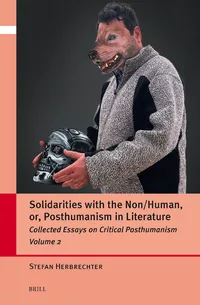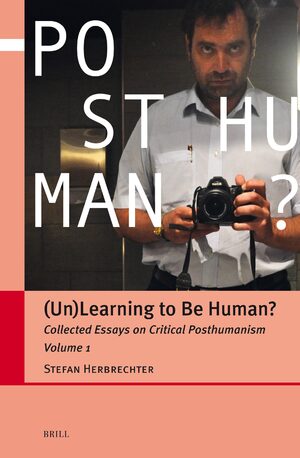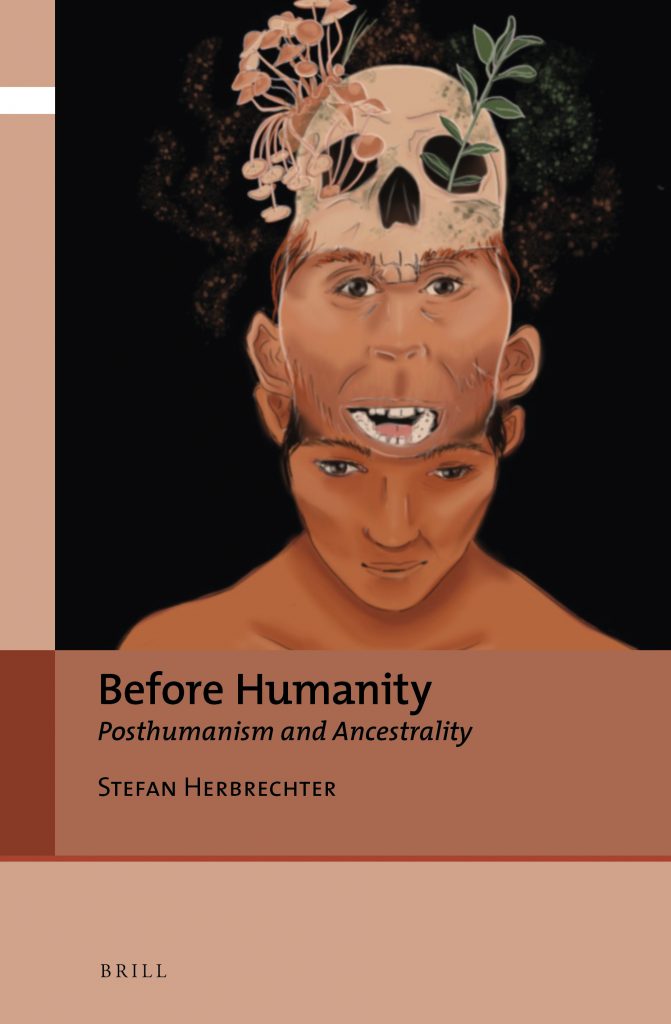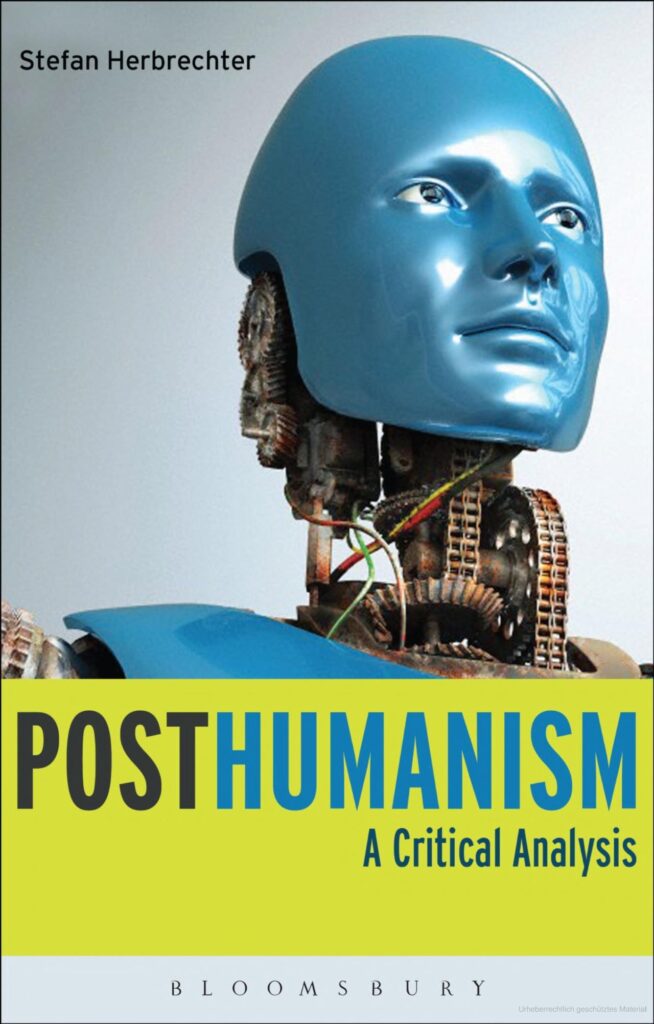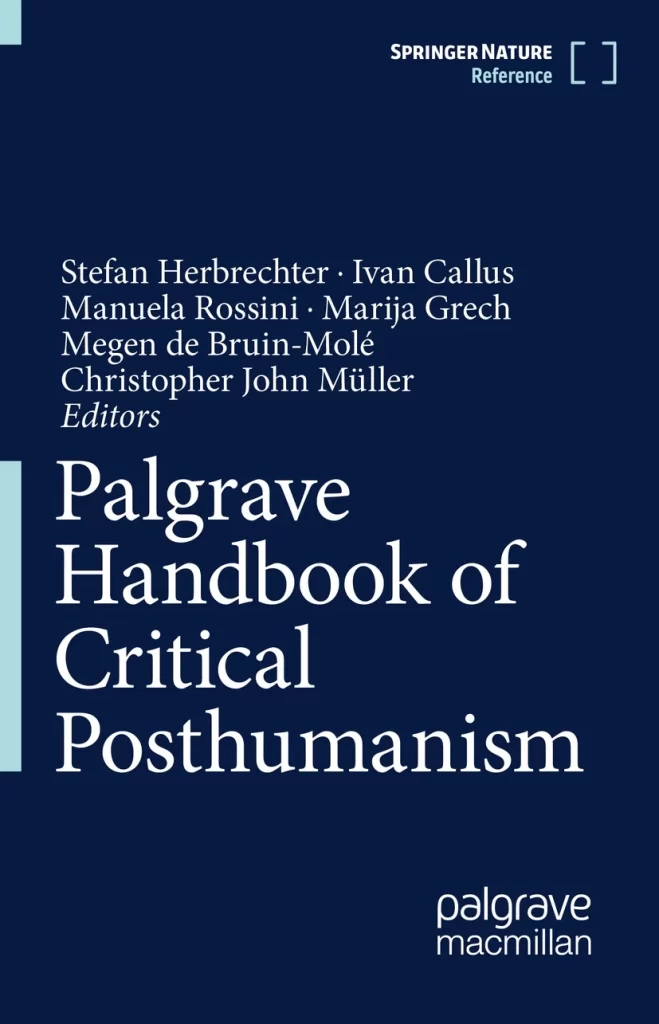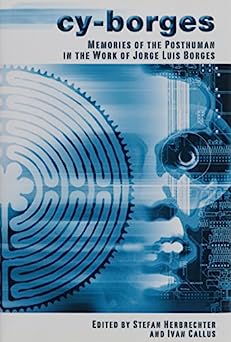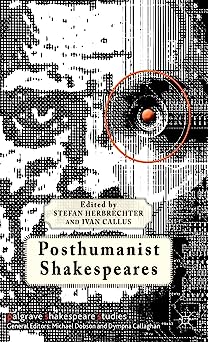
The Palgrave Handbook of Critical Posthumansim is a major reference work on the discourse of posthumanism and the posthuman. Posthumanism is a paradigm emerging from the challenges to humanism and notions of humanity posed by the erosion of traditional demarcations between the human and nonhuman. It problematises anthropocentrism, speciesism and biopolitics, and informs new creative practices from bioart to electronic literature. It impacts institutional changes across the life sciences, new media and the theoretical humanities and reflects the ways in which lifeworlds are reshaped in the embracing of digitalisation, globalisation, virtualisation, prosthesisation and enhancement. The technological, economic and ecological challenges of our time and the uncertainty about human, nonhuman and planetary futures they spell out call for alternative ways of thinking about humanity and its others.
In surveying as well as commenting on this emerging paradigm within the academy but also within culture more generally, this Handbook focuses on work that engages critically and creatively with the challenges and affordances that posthumanism provides. It investigates and contextualises the transformative potential of current developments and relates them to past and existing traditions, ideas and practices, as well as prefigurations and speculations of alternative or emergent scenarios of the human, nonhuman, posthuman, inhuman, ahuman in their entanglements and socialities.
The Handbook focuses on figurations and prefigurations of the posthuman, posthumanist practices and methodologies, as well as processes of institutional and disciplinary transformations. New inter- and transdisciplinary encounters between the humanities and the sciences have led to collaborative practices and greater political and ethical awareness of the place of the human, the nonhuman, and their environments, especially in connection with pressing issues like climate change, the depletion of natural resources, the loss of biodiversity, global migration flows, terrorism, insecurity, biopolitics and extinction, as well as the problematic legacies of colonialism and eurocentrism, which all require a rethinking of the relationship between human agency, the role of technology and the nature-culture divide.
Contents table:
Introduction
| Critical Posthumanism: An Overview, Herbrechter, S., Callus, I., Grech, M., Rossini, M, De Bruin-Molé, M., Müller, C. |
Posthumanism Across the Ages
| Posthumanism and Deep Time, Herbrechter, S. | ||
| Classical Posthumanism, Chesi, G. | ||
| Early Modern Posthumanism, Raber, K. | ||
| Medieval Posthumanism, Montroso, A. | ||
| Posthumanism and the Enlightenment, Landgraf, E. | ||
| Romanticism and Critical Posthumanism, Effinger, E. | ||
| Victorian Posthumanism, Smeele, W. | ||
| Modernism and Posthumanism, Adkins, P. | ||
| Postmodernism and Posthumanism, Boulter, J. | ||
| Posthumanism and Speculative Fiction, Vint, S. |
Technologies and Figurations of the Posthuman
| The Monstrous and Critical Posthumanism, McCormack, D. | ||
| Critical Posthumanism and the Uncanny in Ian McEwan’s Machines Like Me, Nayar, P. | ||
| Colonial Humanism, Alter-humanism and Ex-colonialism, Bignall, S. | ||
| Cute, Otaku, and Posthuman Aesthetics, Gere, C. | ||
| Aesthetics, Autopoiesis, and Posthumanism, Strathausen, C. | ||
| Digitized and Datafied Embodiment: : A More-than-Human Approach, Lupton, D., Clark, M., Southerton, C. | ||
| Science and Technology Studies (STS) and Critical Posthumanism: Ontologies in the Critical Zone, Jensen, C., Auld, E. | ||
| Troubled Distinctions: The Soul in Posthumanist Perspective, von Stuckrad, K. | ||
| Home, Shaw, D. | ||
| The Ahuman, MacCormack, A. |
Posthumanist Practices and Methodologies
| An Emerging Posthumanist Design Landscape, Laurien, T., Jönsson, L., Lilja, P., Lindström, K., Sandelin, E., Ståhl, Å. | ||
| Critical Posthumanist Practices from Within the Museum, Lawler-Dormer, D. | ||
| Sound and Critical Posthumanism, Vallee, M. | ||
| The Incommensurability of Decolonizing Critical Posthumanism, Hird, M., Predko, H., Renders, M. | ||
| Accelerationism:: Adventures in Speed, Noys, B. | ||
| Posthumanism and Digital Gaming, Milesi, L. | ||
| Posthumanist Perturbations: Feminist Engagements with the Human, Hinton, P. | ||
| Critical Posthumanism, Justice, and Law, Käll, J. | ||
| Affective Extractivism: The Dispositional Challenge to Feel Differently, Bösel, B. |
Posthumanist Transformations
| Literature and Posthumanism, Callus, I. | ||
| Posthumanism and Drama: From Shakespeare to Climate Change Plays, Hoydis, J. | ||
| Posthumanism and Anthropology, Howard, C., Küpers, W. | ||
| Geography and Posthumanism, Miele, M., Bear, C. | ||
| Posthumanism and Psychoanalysis, Roof, J. | ||
| Posthumanist Disability Studies, Szarota, M., Liddiard, K., Runswick-Cole, K., Watts, L., Whitney, S., Dobbin, H., Moss, C. | ||
| Human-Animal Studies: Postzoomanities, McHugh, S. | ||
| Posthumanism and Plant Studies, Lemm, V. | ||
| Digital Humanities and Posthumanism, Hayler, M. | ||
| Environmental Posthumanities, Daigle, C. | ||
| Energy Humanities, Badia, L. | ||
| Medical Humanities, McFarlane, A. | ||
| Blue Humanities, Mentz, S. |
Posthumanist In(ter)ventions
| Language, Kirby, V. | ||
| Post-Vital Prajnaparamita, Doyle, R., Conner, T. | ||
| Posthumanism and the Ends of Technology, Iveson, R. | ||
| Entropology, Armand, L. | ||
| Posthumanism and Ethics, Loh, J. | ||
| Narrative and Posthumanism/Posthumanist Narratives, Caracciolo, M. | ||
| Posthumanism and Trauma, Baelo-Allué, S. | ||
| Apocalypse, Mussgnug, F. | ||
| Posthumanism and the Anthropocene, Bergthaller, H., Horn, E. | ||
| Animal Friendship: An Absolute Responsible Posthumanization, Anderson, N. | ||
| Ethics for Cognitive Assemblages: : Who’s in Charge Here?, Hayles, N. |

